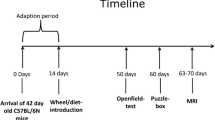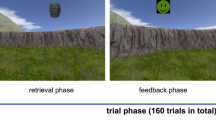Abstract
Growing evidence indicates that physical exercise increases hippocampal volume. This has consistently been shown in mice and men using magnetic resonance imaging. On the other hand, histological studies have reported profound alterations on a cellular level including increased adult hippocampal neurogenesis after exercise. A combined investigation of both phenomena has not been documented so far although a causal role of adult neurogenesis for increased hippocampal volume has been suggested before. We investigated 20 voluntary wheel running and 20 sedentary mice after a period of 2 month voluntary wheel running. Half of each group received focalized hippocampal irradiation to inhibit neurogenesis prior to wheel running. Structural MRI and histological investigations concerning newborn neurons (DCX), glial cells (GFAP), microglia, proliferating and pyknotic cells, neuronal activation, as well as blood vessel density and arborisation were performed. In a regression model, neurogenesis was the marker best explaining hippocampal gray matter volume. Individual analyses showed a positive correlation of gray matter volume with DCX-positive newborn neurons in the subgroups, too. GFAP-positive cells significantly interacted with gray matter volume with a positive correlation in sham-irradiated mice and no correlation in irradiated mice. Although neurogenesis appears to be an important marker of higher hippocampal gray matter volume, a monocausal relationship was not indicated, requesting further investigations.






Similar content being viewed by others
References
Amrein I, Isler K, Lipp HP (2011) Comparing adult hippocampal neurogenesis in mammalian species and orders: influence of chronological age and life history stage. Eur J Neurosci 34(6):978–987
Asami T, Bouix S, Whitford TJ, Shenton ME, Salisbury DF, McCarley RW (2012) Longitudinal loss of gray matter volume in patients with first-episode schizophrenia: DARTEL automated analysis and ROI validation. Neuroimage 59(2):986–996
Ben Abdallah NM, Slomianka L, Vyssotski AL, Lipp HP (2010) Early age-related changes in adult hippocampal neurogenesis in C57 mice. Neurobiol Aging 31(1):151–161
Biedermann S, Fuss J, Zheng L, Sartorius A, Falfan-Melgoza C, Demirakca T, Gass P, Ende G, Weber-Fahr W (2012) In vivo voxel based morphometry: detection of increased hippocampal volume and decreased glutamate levels in exercising mice. Neuroimage 61(4):1206–1212
Bottiger BW, Teschendorf P, Krumnikl JJ, Vogel P, Galmbacher R, Schmitz B, Motsch J, Martin E, Gass P (1999) Global cerebral ischemia due to cardiocirculatory arrest in mice causes neuronal degeneration and early induction of transcription factor genes in the hippocampus. Brain Res Mol Brain Res 65(2):135–142
Chiang CS, McBride WH, Withers HR (1993) Radiation-induced astrocytic and microglial responses in mouse brain. Radiother Oncol 29(1):60–68
Clark PJ, Brzezinska WJ, Puchalski EK, Krone DA, Rhodes JS (2009) Functional analysis of neurovascular adaptations to exercise in the dentate gyrus of young adult mice associated with cognitive gain. Hippocampus 19(10):937–950
Cleppien D, Lei Zheng L, Falfan-Melgoza C, Vollmayr B, Ende G, Weber-Fahr W, Sartorius A (2013) Do Regional Cerebral Blood Volume (rCBV) Effects Partially Explain Short-Termed Changes of Voxel-Based Morphometry (VBM)? Proc Intl Soc Mag Reson Med 21
Demirakca T, Brusniak W, Tunc-Skarka N, Wolf I, Meier S, Matthaus F, Ende G, Schulze TG, Diener C (2014) Does body shaping influence brain shape? Habitual physical activity is linked to brain morphology independent of age. World J Biol Psychiatry 15(5):387–396
Dorr AE, Lerch JP, Spring S, Kabani N, Henkelman RM (2008) High resolution three-dimensional brain atlas using an average magnetic resonance image of 40 adult C57Bl/6J mice. Neuroimage 42:60–69
Erickson KI, Prakash RS, Voss MW, Chaddock L, Hu L, Morris KS, White SM, Wojcicki TR, McAuley E, Kramer AF (2009) Aerobic fitness is associated with hippocampal volume in elderly humans. Hippocampus 19(10):1030–1039
Erickson KI, Voss MW, Prakash RS, Basak C, Szabo A, Chaddock L, Kim JS, Heo S, Alves H, White SM, Wojcicki TR, Mailey E, Vieira VJ, Martin SA, Pence BD, Woods JA, McAuley E, Kramer AF (2011) Exercise training increases size of hippocampus and improves memory. Proc Natl Acad Sci USA 108(7):3017–3022
Franklin TR, Wang Z, Shin J, Jagannathan K, Suh JJ, Detre JA, O’Brien CP, Childress AR (2013) A VBM study demonstrating ‘apparent’ effects of a single dose of medication on T1-weighted MRIs. Brain Struct Funct 218(1):97–104
Fuss J, Ben Abdallah NM, Hensley FW, Weber KJ, Hellweg R, Gass P (2010) Deletion of running-induced hippocampal neurogenesis by irradiation prevents development of an anxious phenotype in mice. PLoS One 5(9):0012769
Fuss J, Vogt MA, Weber KJ, Burke TF, Gass P, Hensler JG (2013) Hippocampal serotonin-1A receptor function in a mouse model of anxiety induced by long term voluntary wheel running. Synapse 67(10):648–655
Fuss J, Biedermann SV, Falfan-Melgoza C, Auer MK, Zheng L, Steinle J, Horner F, Sartorius A, Ende G, Weber-Fahr W, Gass P (2014) Exercise boosts hippocampal volume by preventing early age-related gray matter loss. Hippocampus 24(2):131–134
Giedd JN, Blumenthal J, Jeffries NO, Castellanos FX, Liu H, Zijdenbos A, Paus T, Evans AC, Rapoport JL (1999) Brain development during childhood and adolescence: a longitudinal MRI study. Nat Neurosci 2(10):861–863
Ho NF, Hooker JM, Sahay A, Holt DJ, Roffman JL (2013) In vivo imaging of adult human hippocampal neurogenesis: progress, pitfalls and promise. Mol Psychiatry 18(4):404–416
Hong JH, Chiang CS, Campbell IL, Sun JR, Withers HR, McBride WH (1995) Induction of acute phase gene expression by brain irradiation. Int J Radiat Oncol Biol Phys 33(3):619–626
Killgore WD, Olson EA, Weber M (2013) Physical exercise habits correlate with gray matter volume of the hippocampus in healthy adult humans. Sci Rep 3:3457
Klauschen F, Goldman A, Barra V, Meyer-Lindenberg A, Lundervold A (2009) Evaluation of automated brain MR image segmentation and volumetry methods. Hum Brain Mapp 30(4):1310–1327
Knoth R, Singec I, Ditter M, Pantazis G, Capetian P, Meyer RP, Horvat V, Volk B, Kempermann G (2010) Murine features of neurogenesis in the human hippocampus across the lifespan from 0 to 100 years. PLoS One 5(1):e8809
Luders E, Steinmetz H, Jancke L (2002) Brain size and grey matter volume in the healthy human brain. Neuro Report 13(17):2371–2374
Manganas LN, Zhang X, Li Y, Hazel RD, Smith SD, Wagshul ME, Henn F, Benveniste H, Djuric PM, Enikolopov G, Maletic-Savatic M (2007) Magnetic resonance spectroscopy identifies neural progenitor cells in the live human brain. Science 318(5852):980–985
Pajonk FG, Wobrock T, Gruber O, Scherk H, Berner D, Kaizl I, Kierer A, Muller S, Oest M, Meyer T, Backens M, Schneider-Axmann T, Thornton AE, Honer WG, Falkai P (2010) Hippocampal plasticity in response to exercise in schizophrenia. Arch Gen Psychiatry 67(2):133–143
Pereira AC, Huddleston DE, Brickman AM, Sosunov AA, Hen R, McKhann GM, Sloan R, Gage FH, Brown TR, Small SA (2007) An in vivo correlate of exercise-induced neurogenesis in the adult dentate gyrus. Proc Natl Acad Sci USA 104(13):5638–5643
Ramm P, Couillard-Despres S, Plotz S, Rivera FJ, Krampert M, Lehner B, Kremer W, Bogdahn U, Kalbitzer HR, Aigner L (2009) A nuclear magnetic resonance biomarker for neural progenitor cells: is it all neurogenesis? Stem Cells 27(2):420–423
Reif A, Fritzen S, Finger M, Strobel A, Lauer M, Schmitt A, Lesch KP (2006) Neural stem cell proliferation is decreased in schizophrenia, but not in depression. Mol Psychiatry 11(5):514–522
Schlaffke L, Lissek S, Lenz M, Brune M, Juckel G, Hinrichs T, Platen P, Tegenthoff M, Schmidt-Wilcke T (2014) Sports and brain morphology - a voxel-based morphometry study with endurance athletes and martial artists. Neuroscience 259:35–42
Smith SM, Jenkinson M, Woolrich MW, Beckmann CF, Behrens TE, Johansen-Berg H, Bannister PR, De Luca M, Drobnjak I, Flitney DE, Niazy RK, Saunders J, Vickers J, Zhang Y, De Stefano N, Brady JM, Matthews PM (2004) Advances in functional and structural MR image analysis and implementation as FSL. Neuroimage 23(Suppl 1):S208–S219
Spalding KL, Bergmann O, Alkass K, Bernard S, Salehpour M, Huttner HB, Bostrom E, Westerlund I, Vial C, Buchholz BA, Possnert G, Mash DC, Druid H, Frisen J (2013) Dynamics of hippocampal neurogenesis in adult humans. Cell, 2013/06/12 edn, pp 1219–1227
Strekalova T, Zorner B, Zacher C, Sadovska G, Herdegen T, Gass P (2003) Memory retrieval after contextual fear conditioning induces c-Fos and JunB expression in CA1 hippocampus. Genes Brain Behav 2(1):3–10
Toni N, Laplagne DA, Zhao C, Lombardi G, Ribak CE, Gage FH, Schinder AF (2008) Neurons born in the adult dentate gyrus form functional synapses with target cells. Nat Neurosci 11(8):901–907
van Praag H, Kempermann G, Gage FH (1999) Running increases cell proliferation and neurogenesis in the adult mouse dentate gyrus. Nat Neurosci 2(3):266–270
van Praag H, Shubert T, Zhao C, Gage FH (2005) Exercise enhances learning and hippocampal neurogenesis in aged mice. J Neurosci 25(38):8680–8685
von Bohlen, Halbach O (2011) Immunohistological markers for proliferative events, gliogenesis, and neurogenesis within the adult hippocampus. Cell Tissue Res 345(1):1–19
Voss MW, Vivar C, Kramer AF, van Praag H (2013) Bridging animal and human models of exercise-induced brain plasticity. Trends Cogn Sci 17(10):525–544
Zhang L, Cooper-Kuhn CM, Nannmark U, Blomgren K, Kuhn HG (2010) Stimulatory effects of thyroid hormone on brain angiogenesis in vivo and in vitro. J Cereb Blood Flow Metab 30(2):323–335
Acknowledgments
This work was supported in part by grants from the Deutsche Forschungsgemeinschaft to Peter Gass (SFB636-B3) and Gabriele Ende (SFB636-Z3). We gratefully thank Prof. Dr. Klaus-Josef Weber for providing the irradiation equipment.
Conflict of interest
None.
Author information
Authors and Affiliations
Corresponding author
Additional information
S.V. Biedermann and J. Fuss share first authorship. P. Gass and W. Weber-Fahr share last authorship.
Rights and permissions
About this article
Cite this article
Biedermann, S.V., Fuss, J., Steinle, J. et al. The hippocampus and exercise: histological correlates of MR-detected volume changes. Brain Struct Funct 221, 1353–1363 (2016). https://doi.org/10.1007/s00429-014-0976-5
Received:
Accepted:
Published:
Issue Date:
DOI: https://doi.org/10.1007/s00429-014-0976-5




